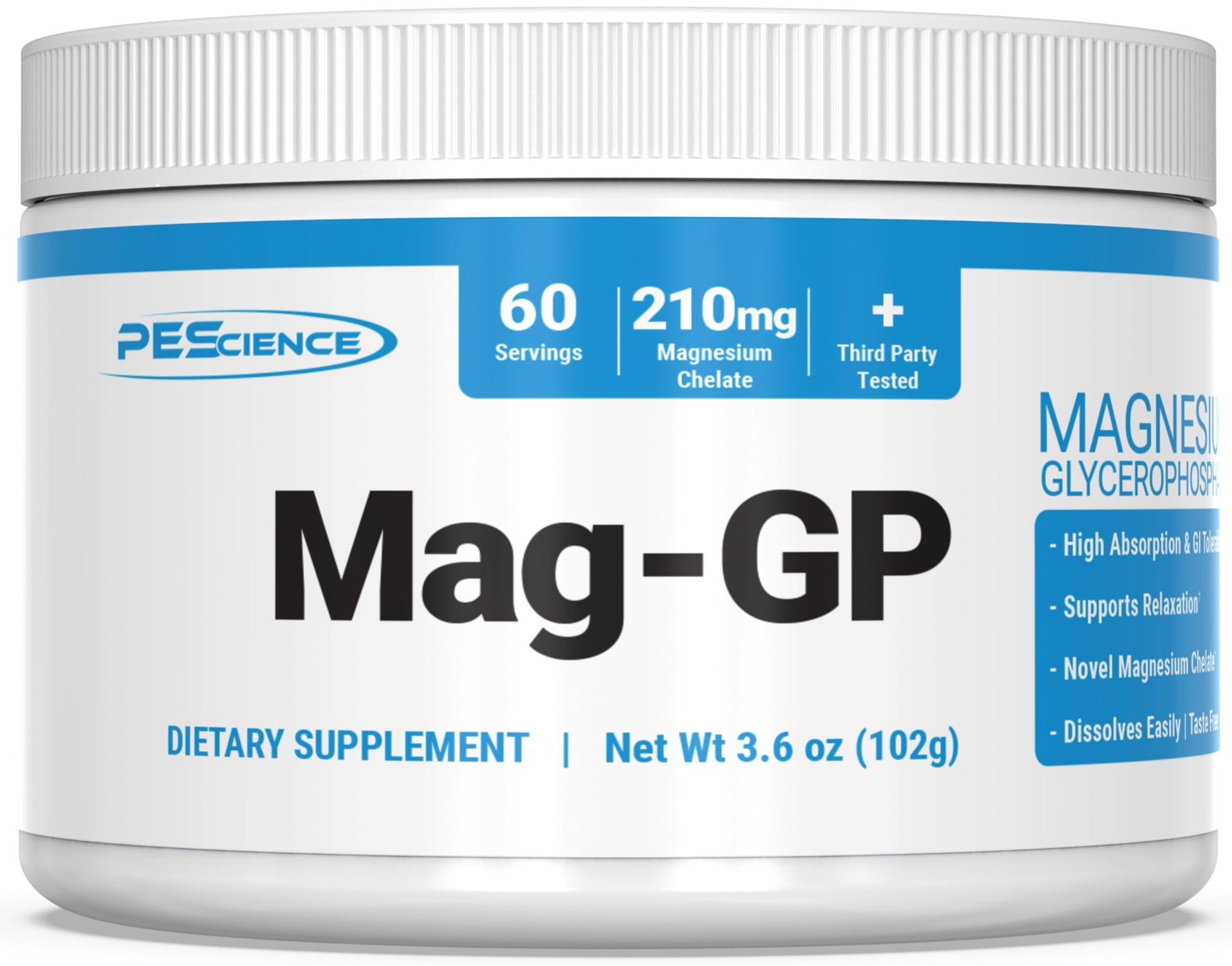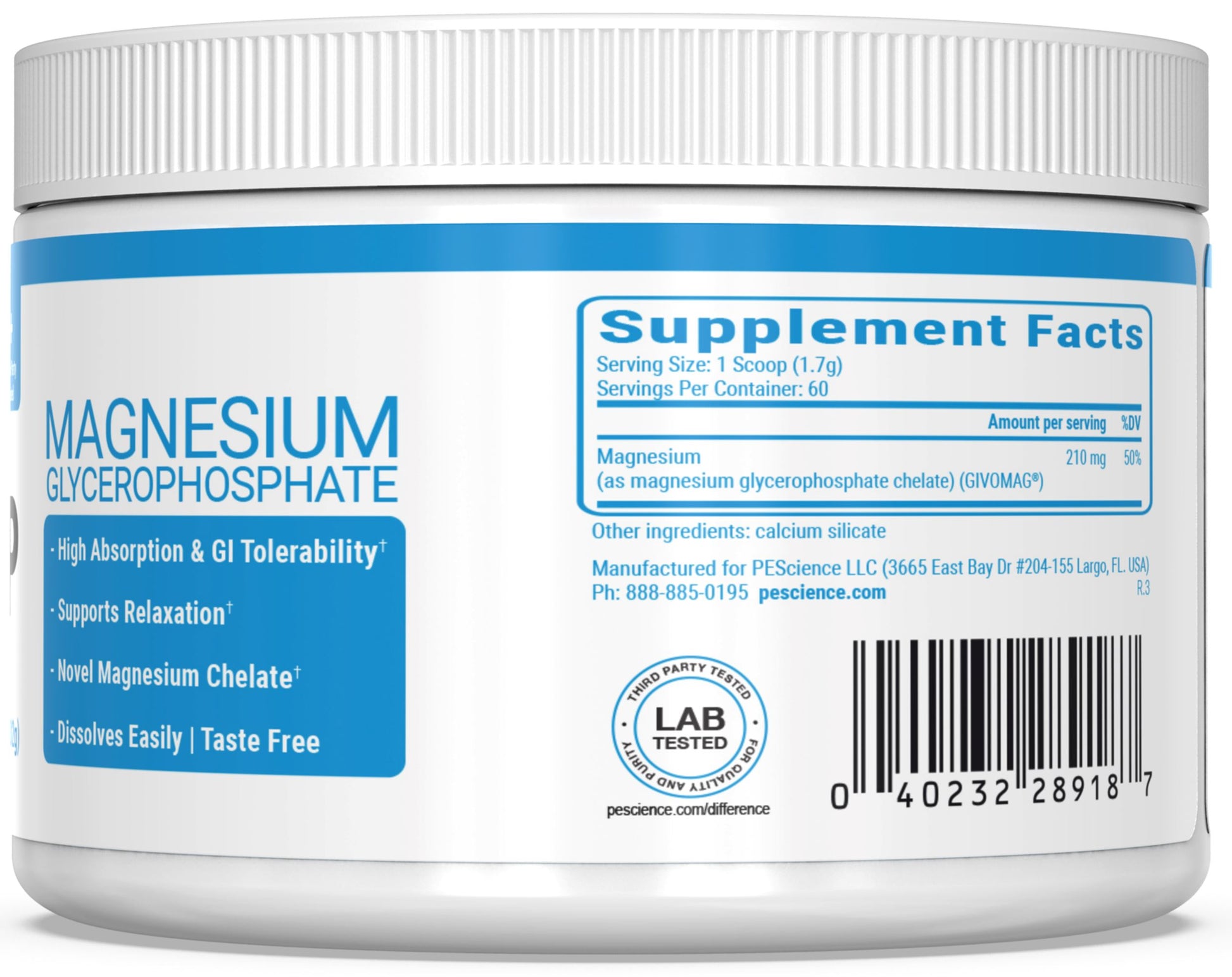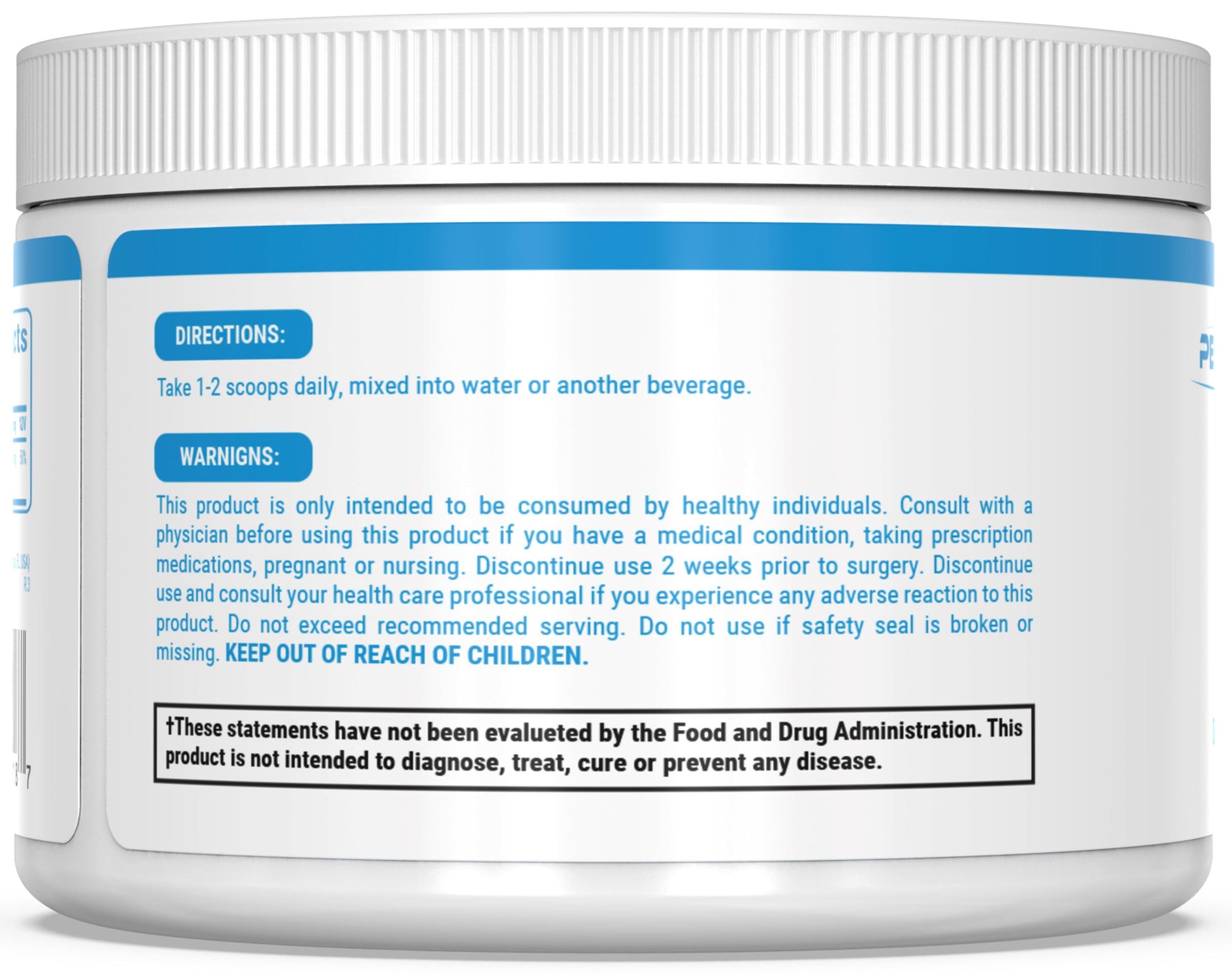Mag-GP Magnesium Powder
Taste-Free, High-Absorption Magnesium by PEScience
Couldn't load pickup availability
Share
60 servings. High-bioavailability and high-absorption magnesium glycerophosphate chelate is the newest form of magnesium that brings everything you want.
Taste-free, dissolves easily, and digests perfectly. Get all the benefits of magnesium from sleep to muscle and bone support in an easy to drink daily powder. Third party tested for quality and purity.
- Gluten Free
- Third-Party Tested
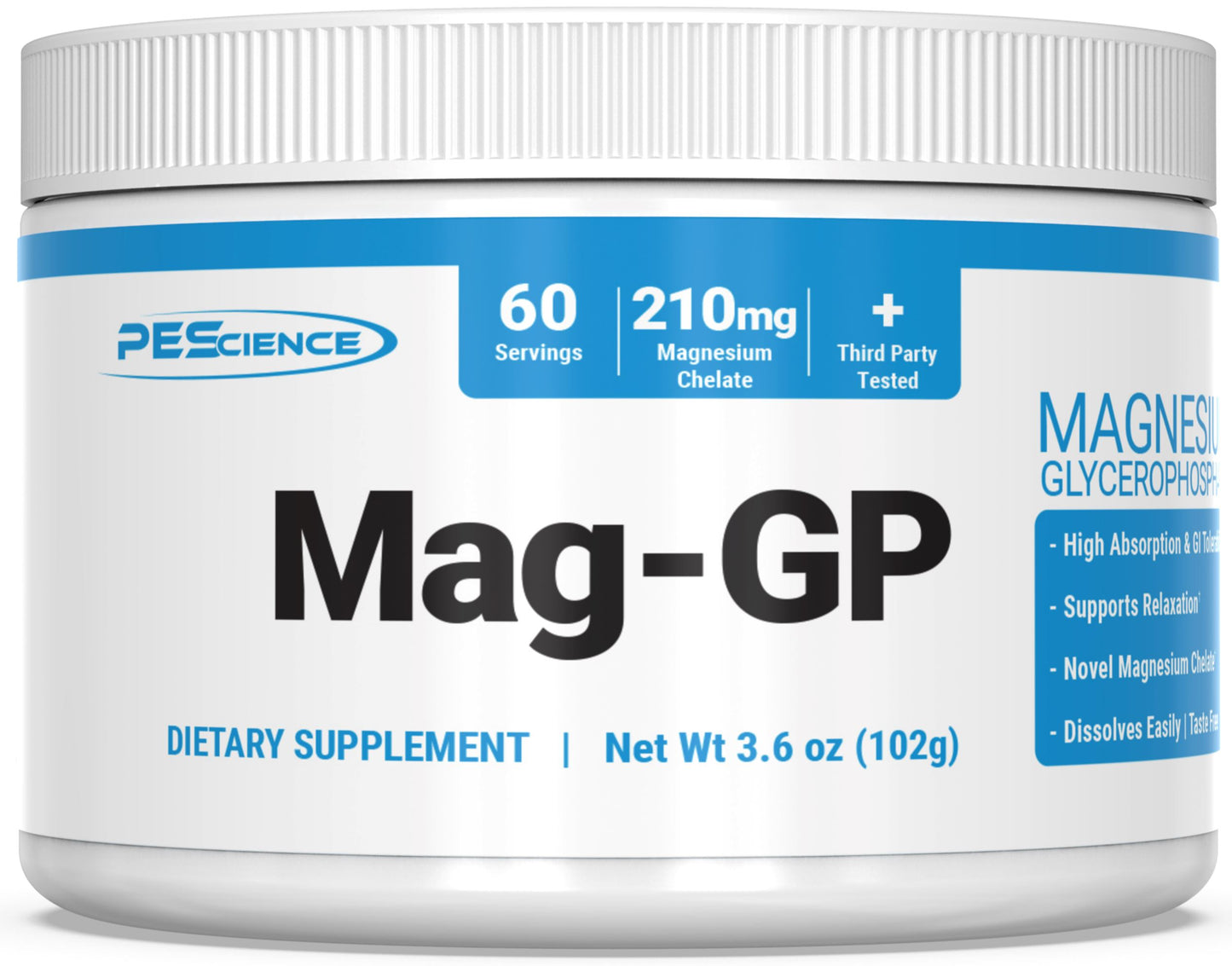
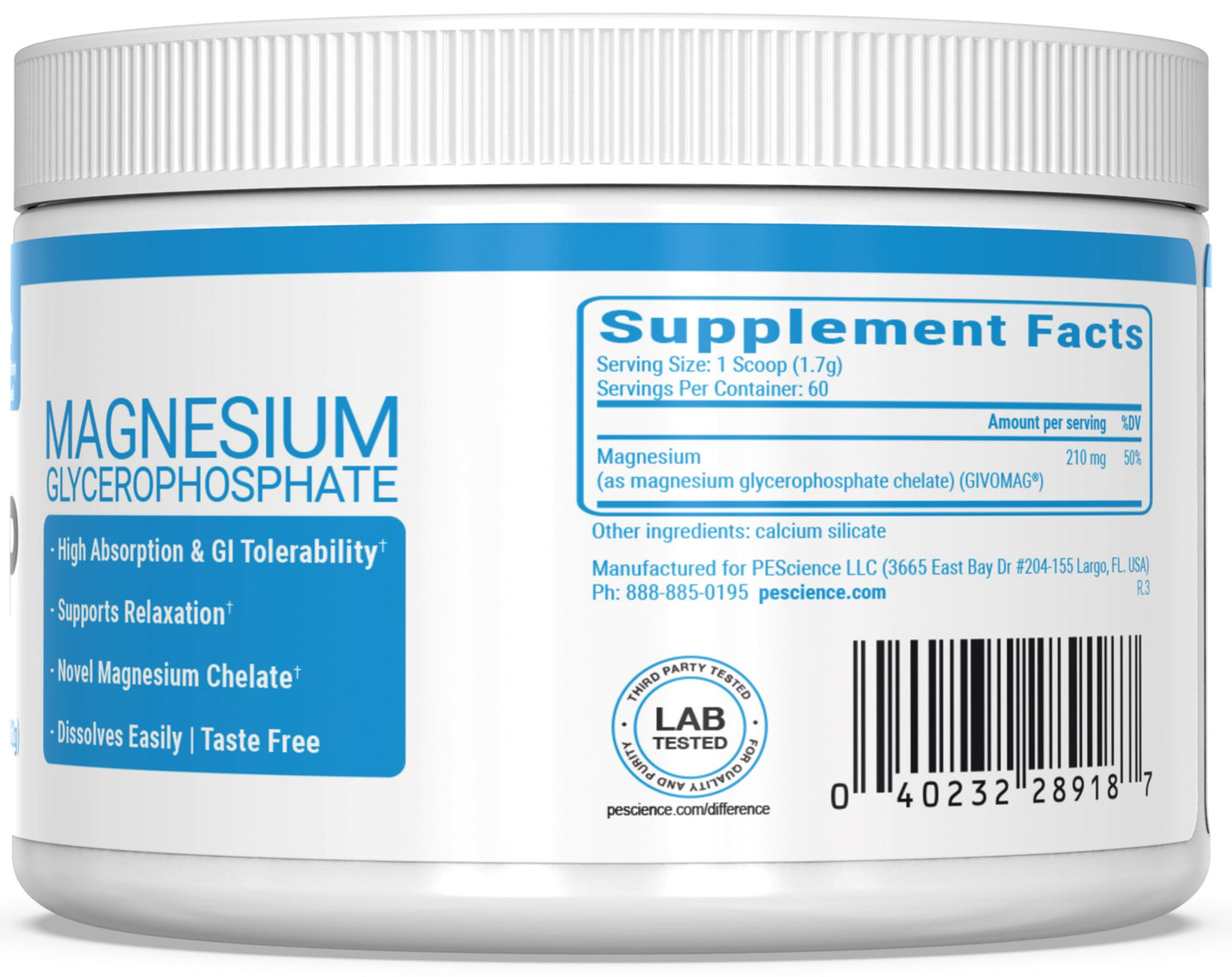
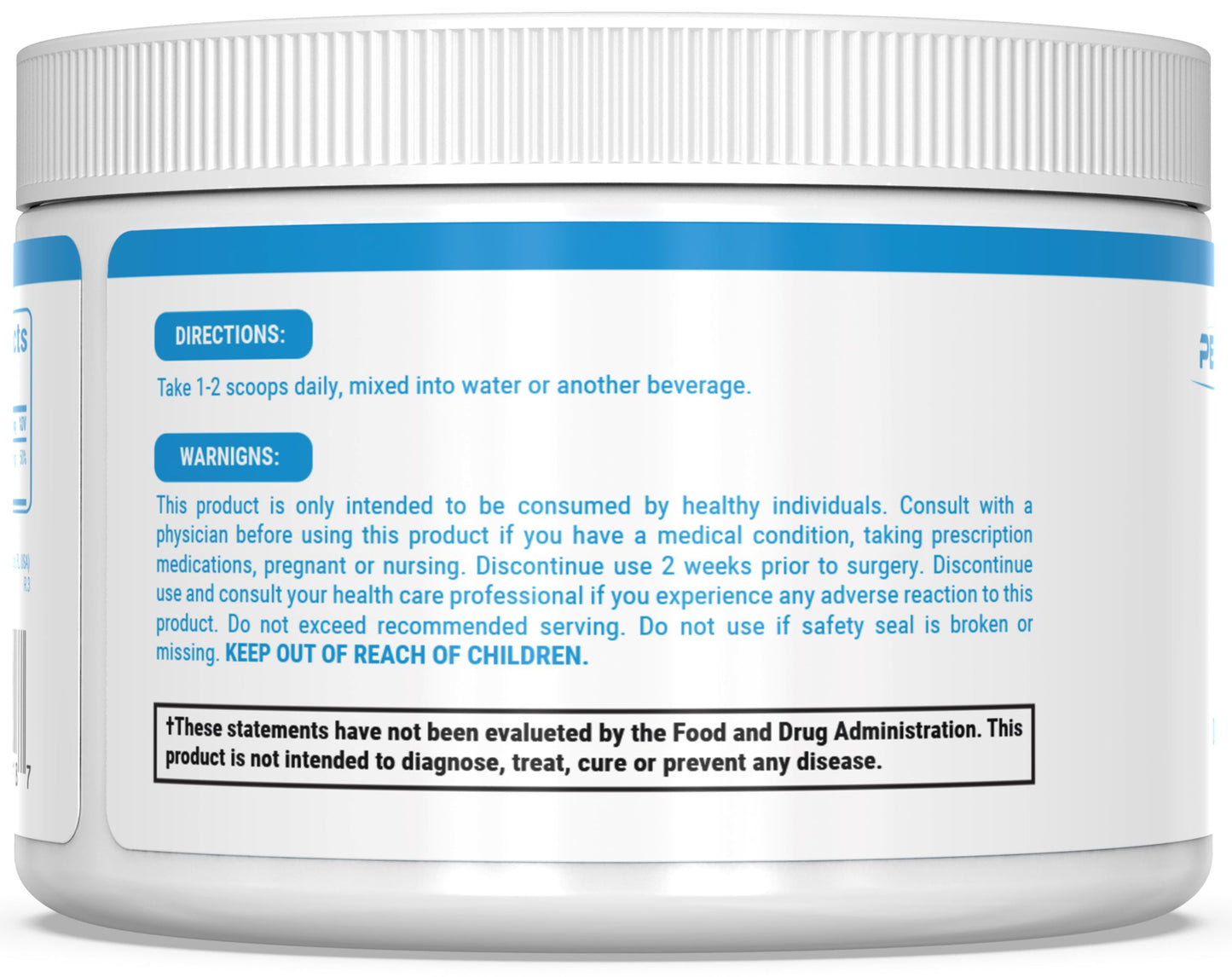
Mag-GP Difference:
-
High Bioavailability
Chelated magnesium (Mg) is best for absorption, but once it is absorbed into the bloodstream it now must be metabolized (broken down) in order for the Mg to be used by the body. Even if it's all absorbed, if it has poor metabolism the Mg won't have any benefits and will simply be excreted out through urine. Clinical data in adults has shown that the Mg in Mag-GP is not only highly absorbed, but metabolized and used by the body.
-
Solubility & Taste
Solubility is a nice feature when it comes to mixing your Mag-GP into water or another beverage, but it also plays a role into how well the magnesium is absorbed through the small intestine and into the bloodstream. Mag-GP is ultra-soluble. It's solubility is even greater than other chelated magnesium types such as glycinate. On top of that, Mag-GP has no taste!
-
Chelated Magnesium
Chelated minerals generally have better absorption. The strong magnesium-glycerophosphate bond allows Mag-GP to survive the stomach acid and move to the small intestine to be absorbed into the bloodstream. The better the absorption, the less GI & stomach distress one will experience. We went for ultra-absorption.
-
Non-Laxative
Studies on the magnesium used in Mag-GP have been used at doses of 500mg elemental Mg with zero laxative affects. We suggest using between 210-420mg per day (1-2 scoops), depending on your age, sex, goals, and overall diet.
-
Vital Mineral
Magnesium is vital for the proper functioning of your body, and your body can’t make it on its own. You have to obtain it from your diet, whether from eating foods high in magnesium or from taking magnesium supplements like Mag-GP. Studies have shown nearly 50% of people in the US don't get enough magnesium, which has a recommended serving of 400mg-420mg per day for men, and 320mg-360mg for women.
-
Multi-Benefit
Magnesium is most commonly used for relaxation, muscle recovery, or cardiovascular and bone support. Athlete's typically have lower amounts of magnesium after completing training, and can benefit from supplementing magnesium to restore magnesium levels.
Everything You Need to Know About This Product
Supplement Facts
Quality & Purity Testing
All of our raw materials are tested for purity prior to being used in our manufacturing. After manufacturing is complete, another round of third-party testing occurs on the finished product before it is released for sale.
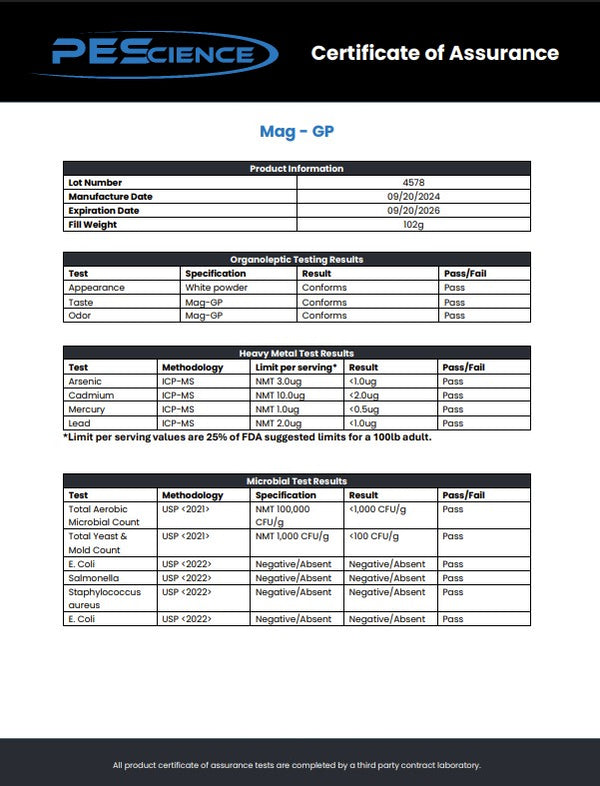
Ask a Question
Technical Product Writeup
Magnesium is a mineral essential for hundreds of enzymatic processes, regulating energy metabolism, protein synthesis, muscle and nerve function, and blood glucose and blood pressure.
Despite its importance, it has been suggested that over 50% of people don't consume the recommended amounts of magnesium.
This makes supplementing with magnesium a great way to ensure you're getting enough to support its important role in various physiological functions.
But, not all forms of magnesium are the same — some have low bioavailability, meaning it's poorly absorbed and used by your body. These low bioavailable forms are also more likely to cause gastrointestinal stress and diarrhea (not fun).
Recognizing this, PEScience formulated Mag-GP with a highly bioavailable form of magnesium as magnesium glycerophosphate chelate.
Discover how magnesium glycerophosphate chelate stands out from other forms and who can benefit most from magnesium supplementation.
Mag-GP vs. Other Magnesium Forms
Magnesium supplements are available in a variety of forms and delivery types, including capsules, tablets, powders, and liquids.
Some forms are inorganic salts of magnesium — like magnesium oxide — and provide a high amount of elemental magnesium but have very poor bioavailability.
Magnesium that isn't well absorbed by your small intestine continues to travel to your large intestine where the salts induce osmotic activity and stimulate gastric motility, causing diarrhea and laxative effects.
Other forms are organic salts of magnesium, offering a higher level of bioavailability but providing low levels of elemental magnesium, such as magnesium citrate.
While the type of salt isn't the only factor that influences magnesium absorption, most studies have demonstrated that organic salts of magnesium have a higher bioavailability than inorganic salts (1).
As an organic salt, magnesium glycerophosphate chelate is highly absorbed so more magnesium reaches your bloodstream and less is excreted as waste. This also means that this form, unlike others, won't cause stomach distress.
Magnesium glycerophosphate chelate supplies magnesium, glycerol, and phosphorus.
While magnesium is the real star, glycerol and phosphorus also offer benefits, especially for athletes since glycerol can help with hydration, and phosphorus is a key component of energy formation within cells.
Who Can Benefit from Magnesium?
Three groups of people can benefit from magnesium supplementation:
Athletes
Magnesium plays an essential role in the formation and storage of adenosine triphosphate (ATP).
Commonly referred to as the energy currency of the cell, ATP supplies your muscles with the energy they need to move and contract.
Because athletes require more ATP than their sedentary counterparts to support the physical demands of exercise, ensuring adequate magnesium is crucial.
Athletes also need more magnesium than the general public since exercise increases magnesium loss in sweat.
It's unlikely that magnesium supplementation can improve physical performance in athletes with high magnesium levels, but owing to magnesium's important role in energy metabolism, having low levels — which is common among athletes — can impair performance (2, 3).
Thus, because exercise increases magnesium needs, supplementing with it can be useful for preventing the declines in performance associated with low magnesium levels (4).
To this point, studies have demonstrated a positive association between adequate magnesium status and various measures of muscle performance.
Furthermore, magnesium supplementation may reduce muscle soreness and improve muscle recovery (5).
Health and wellness groups
Magnesium supplementation is a great way to support various aspects of overall health and wellness.
For instance, magnesium supplementation may:
- improve sleep quality
- support mood and overall mental health
While magnesium can benefit athletes and has many clinical applications, supplementation can support an overall healthy lifestyle, acting as a preventative health strategy.
How to Take Mag-GP?
It's important to know how to use Mag-GP correctly and effectively to get the most out of it.
Each tub provides 60 servings as an easily dissolvable, taste-free powder. Each serving provides 210 mg of magnesium, well below the tolerable upper intake level (UL) established for magnesium supplements. The UL is the maximum daily intake unlikely to cause adverse health effects.
Because it dissolves easily and is tasteless, you can mix it with your beverage of choice. Mag-GP is already highly absorbable, but taking it with protein can further enhance absorption, making it perfect to add to PEScience's popular Select Protein powder (1).
Alternatively, because magnesium has relaxing effects, you can take Mag-GP before bed or mix it with coffee or tea to mellow out caffeine's effects.
How Much Magnesium Do You Need?
The daily value for magnesium is 420 mg for adults and children aged four years and older (6).
Magnesium is present in a wide variety of foods. Examples of good sources (containing at least 10% of the DV) include:
- pumpkin seeds, 1 ounce
- chia seeds, 1 ounce
- almonds, 1 ounce
- spinach, 1/2 cup boiled
- cashews, 1 ounce
- peanuts, 1/4 cup
- soy milk, 1 cup
- potatoes, 3.5 ounces baked
- brown rice, 1/2 cup cooked
- yogurt, 8 ounces
- breakfast cereals, 1 serving
The primary source of magnesium in most people's diets comes from cereal grains but its content has decreased over the years due to potassium competing with the absorption of magnesium by plants and due to agricultural practices using soil deficient in magnesium for growing food (14).
The risk of consuming too much magnesium from food is rare in healthy individuals since the body tightly regulates levels of the mineral, absorbing more when status is low, or excreting more when status is high.
However, high doses of magnesium supplementation can cause diarrhea, nausea, and abdominal cramping. This is especially true for certain forms like magnesium carbonate, chloride, gluconate, and oxide.
Beyond supplementation and food, magnesium-containing laxatives and antacids can contribute to magnesium status.
The Bottom Line
Magnesium is crucial for numerous physiological functions, including energy metabolism, protein synthesis, and regulating muscle and nerve function, as well as blood glucose and blood pressure.
Despite its essential role, over 50% of people do not meet the recommended intake, and certain conditions and lifestyle choices can exacerbate magnesium loss, making supplementation beneficial.
However, not all magnesium supplements are created equal — some forms have low bioavailability and can cause gastrointestinal issues.
PEScience's Mag-GP uses magnesium glycerophosphate chelate, a highly bioavailable form that maximizes absorption and minimizes gastrointestinal distress, proving particularly advantageous for athletes and those with conditions that impair magnesium absorption or increase its loss.
-
Gavin Van De Walle, MS, RD
Gavin Van De Walle holds a master’s degree in human nutrition and exercise physiology. He is also a registered dietitian. Gavin has a bias for the truth and aims to provide the public with the information they need to make educated and informed health decisions. His work has appeared in a variety of publications, including Healthline, Livestrong, the American Botanical Council, Underwriter Laboratories, Verywell Health, and many more.
Want new product notifications?
Be the first to know.

